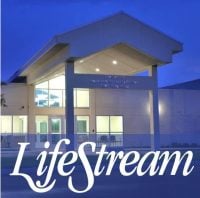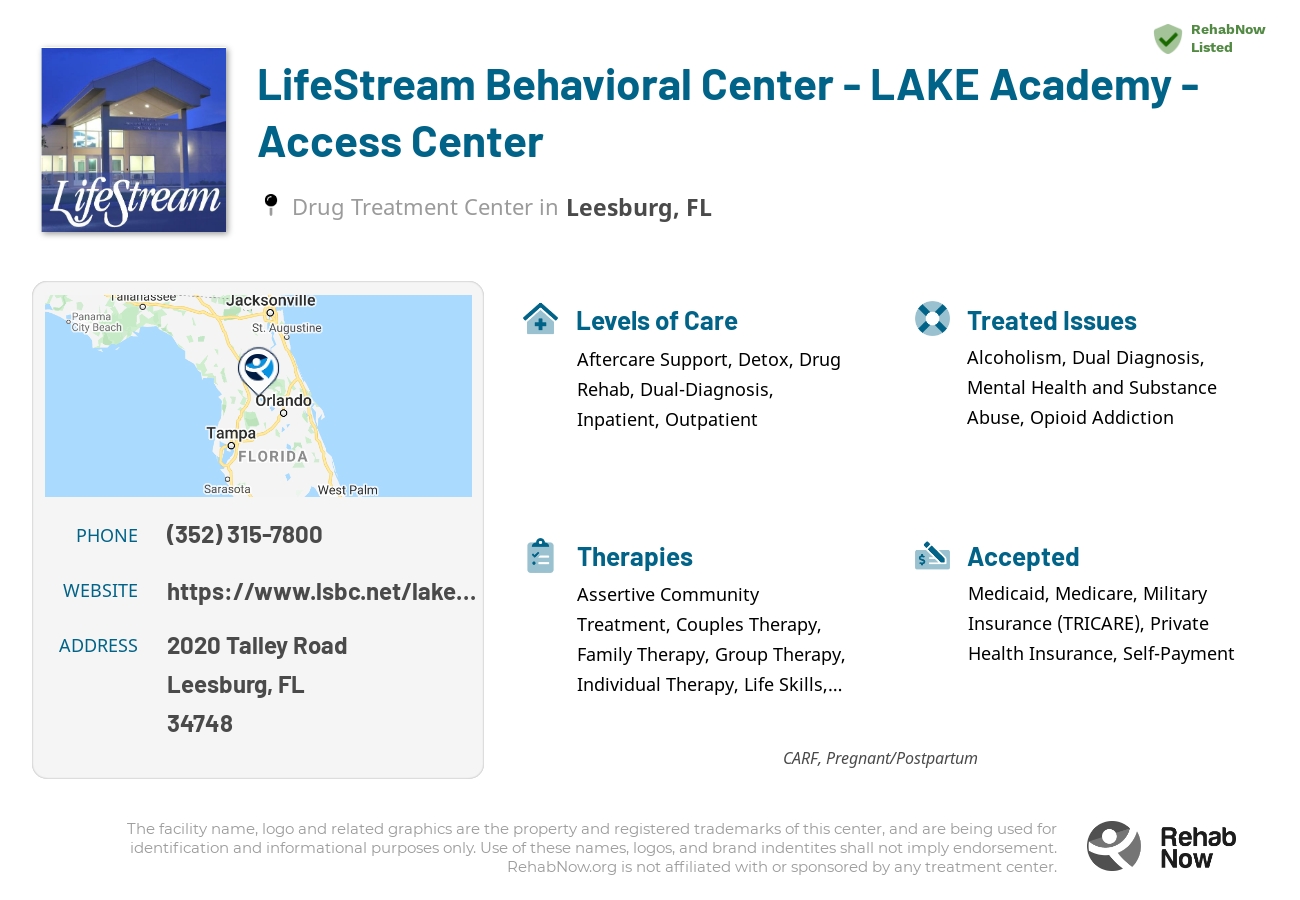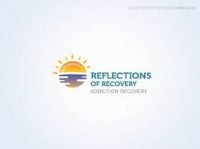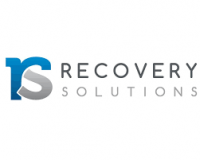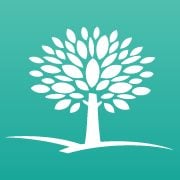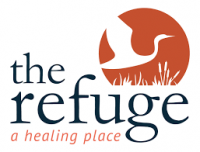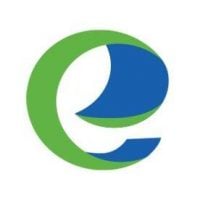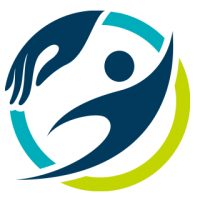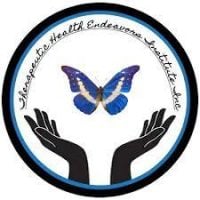LifeStream Behavioral Center - LAKE Academy - Access Center
Drug Rehab Center in Leesburg, Florida
LifeStream Behavioral Center - LAKE Academy - Access Center is a CARF-accredited Addiction Treatment Facility located in Leesburg, FL, offering comprehensive levels of care for individuals dealing with Alcoholism, Dual Diagnosis, Opioid Addiction, and Drug Addiction, accepting private health insurance and affiliated with LifeStream Behavioral Center.
About LifeStream Behavioral Center - LAKE Academy - Access Center in Florida
LifeStream Behavioral Center - LAKE Academy/Access Center, situated in Leesburg, Florida, specializes in providing both inpatient and outpatient services for individuals dealing with alcohol and/or substance addiction. This center stands out for its strong commitment to supporting recovery, promoting health, and creating hope. With a professional team dedicated to a multi-specialty approach, LifeStream emphasizes the potential of each individual to recover and lead a fulfilling life.
- Accredited by CARF and state-licensed, ensuring high-quality care standards.
- Offers a range of services including detoxification, drug rehabilitation, and dual-diagnosis treatment.
- Provides both inpatient and outpatient care tailored to individual needs, promoting a personalized path to recovery.
LifeStream Behavioral Center is recognized for its excellence in addiction treatment, backed by accreditations from the Commission on Accreditation of Rehabilitation Facilities (CARF) and a state license. These accreditations affirm their commitment to providing the highest standards of care, reviewed annually by state and federal regulatory agencies.
Specializing in treating alcoholism, dual diagnosis, opioid addiction, and drug addiction, LifeStream Behavioral Center - LAKE Academy/Access Center employs a comprehensive approach. Treatment methods include aftercare support, detoxification services, and tailored inpatient and outpatient programs, addressing both addiction and underlying mental health issues to foster long-term recovery.
Genders
Ages
Modality
Additional
Accreditations
State License

CARF
The Commission on Accreditation of Rehabilitation Facilities (CARF) is a non-profit organization that specifically accredits rehab organizations. Founded in 1966, CARF's, mission is to help service providers like rehab facilities maintain high standards of care.
Conditions and Issues Treated
Opioid addiction starts when a person becomes addicted to legal or illegal opioids. The addiction can happen quickly, in just a matter of days. Opioid withdrawal can be extremely uncomfortable and lead the user to continue to use even if they want to quit. Stopping using an opioid requires medical observation. Sometimes inpatient treatment with a medically supervised detox is necessary for managing the withdrawal process while learning lasting tools for maintaining recovery. Medications may be used in some cases of opioid addiction.
Opioid addiction is one of Florida‘s most prominent forms of addiction. It’s treated by detoxifying the body so that the chemicals from the medications no longer impact them and by therapies to correct behavior and target the root of the problem.
Recovery is not simply about stopping drug use. Recovery is working with addiction while recovering mental health issues that are fueling the addiction in the first place.
Levels of Care Offered
This center offers a variety of custom treatment tailored to individual recovery. Currently available are Aftercare Support, Detox, Drug Rehab, Dual-Diagnosis, Inpatient, Outpatient, with additional therapies available as listed below.
Detox is the first step of rehab. It involves giving a person time to get the toxins out of their body. During detox, the patient gets ill and they will often start using again to get rid of these unpleasant feelings. That’s why it’s so important to have a Leesburg medical professional at LifeStream Behavioral Center - LAKE Academy - Access Center present. A Florida medical professional will make sure patients don’t start using during detox. They will also provide medication to ease their symptoms and coach them through on a mental level.
Individuals who are suffering from severe addiction or have a high risk for dangerous health concerns are often recommended to receive inpatient treatment.
Choosing to enter an inpatient treatment program is beneficial for people who are suffering from severe addiction, or who have a high risk for dangerous health concerns.
Inpatient treatment is beneficial for:
- People who have a history of severe withdrawal.
- People who have attempted to overcome addiction on their own without success.
- People who have a history of relapse, or have recently relapsed.
- People at risk for drug overdose or withdrawal-related complications.
- People with medical conditions that are worsened by drug or alcohol use.
Outpatient treatment is considered the lower intensity level of addiction treatment. It’s ideal for early phase addiction or lower intensity addictions. It may include weekly sessions instead of daily. It may include weekly sessions instead of daily. Peer group support, 12-step programs, and individual counseling may still be involved but at a lesser frequency than an intensive outpatient program. It is a good choice for someone who doesn’t need to go through a medically supervised detox and who has a supportive home environment. It requires motivation and dedication to commit to the program without constant monitoring.
Aftercare support should take place after outpatient treatment has ended. There are a few different types of aftercare support that patients can seek. These include 12 Step, Self-help groups (AA, NA), Therapeutic communities, Long-term, structured sober living arrangements, and Halfway houses (residential treatment centers).
Therapies & Programs
Individual therapy involves one-on-one sessions between the patient and therapist. It provides patients with a safe environment to openly discuss personal and sensitive issues with the therapist. They find the therapist as someone they can trust. Individual therapy aims to identify the core issues that would have led the patient to substance abuse and address them effectively. The therapist can develop patient-specific customized solutions through individual therapy, which aids speedier recovery.
Couples therapy works with clients and significant others in a professional capacity to improve relationship dynamics. This can be helpful for addicts who are trying to marry the idea of recovery into their work, family, social lives – any aspect that has to do with relationships.
Through counseling sessions, addicts will have an opportunity to talk about their addiction with professional partners. These partners can offer feedback and advice on how to get sober while keeping healthy relationships intact. A good couples therapist will help addicts understand their part in an unhealthy relationship dynamic or find ways to deal with anger or resentment from significant others outside of the home.
Family therapy is a group problem-solving that aims to improve communication and relationships between the addict, their family, and sometimes friends. The main goal of family therapy for drug addiction is to create an environment where communication can occur without judgment, hostility, or blame. The therapist is with the family as they learn to communicate differently, especially with the addict when s/he is using. The family can learn to reduce their enabling behavior or rally together and support each other during tough times.
An addict’s family can play a vital part in helping them to avoid relapse because they can spot the warning signs and help them get back on track before it becomes too much of a problem. Family therapy is one of the most effective ways to help addicts stay on the path to long-term sobriety. When a drug addict decides that they want to try and get sober, it takes the support of every person they love to succeed. It can be incredibly difficult for loved ones to watch an addict go through the pain and suffering of withdrawal, but by being there with them and supporting them, they can help to make sure that the addiction never returns.
Groups typically involve meetings with other recovering addicts who can relate to one another’s experiences. They might meet in person or online and typically focus on the process of staying sober rather than overcoming a specific addiction.
In these groups managed by LifeStream Behavioral Center - LAKE Academy - Access Center, addicts can build a sense of community and develop strong emotional connections with others who understand what they are going through. These beneficial relationships can help addicts overcome their cravings and prevent relapse at any point during the recovery process.
In general, trauma therapy is a clinical process that helps individuals deal with mental stress often caused by traumatic events. The therapist helps the person identify, understand, and work through the problem. This is done with the help of talking about it in group or one-on-one counseling sessions. Therapists use relaxation, role-playing, art, and music to help the person open up about what is bothering them.
There are many different types of trauma therapists, such as psychiatric nurses and counselors. Not everyone is a good candidate for this type of therapy; it is generally reserved for people who have recently experienced a traumatic event and struggle to get over it. It is often done for children, teenage victims of sexual assault, and war veterans.
There is hope for people who are addicted to drugs and alcohol. Cognitive Behavioral Therapy (CBT) is the solution. CBT focuses on the underlying thoughts and behaviors that caused the addiction problem in the first place and may cause a relapse. This type of psychotherapy addresses negative feelings common in substance abuse disorders. It helps to change them by restructuring thought patterns. It’s about removing negative thoughts and providing long-term benefits while promoting self-awareness, self-control, and healthy ways to respond to negative thoughts. These sessions can be done by themselves or as part of combination therapy.
Since addiction is a chronic physical and mental illness, addicts need to learn as many life skills as possible. Many drug treatment centers offer life skills activities as part of their addiction recovery programs. Examples include cooking classes, employment training, resume writing seminars, parenting classes, and computer training. Life skills activities help addicts find employment, take care of their families, and give back to the community.
The goal of medical nutrition therapy for drug and alcohol addiction is to help patients avoid “trigger” foods. For example, someone who craves alcohol may be addicted to sugar. Making sure this person eats a balanced diet with recommended amounts of protein, vegetables, and fruit can help manage urges to drink.
Nicotine replacement therapy treats nicotine addiction using external sources of nicotine, such as patches or gum to substitute for nicotine. This allows people trying to quit smoking to get their desired dose of nicotine without actually having to smoke cigarettes. The idea behind NRT is that by providing smokers with nicotine in forms that are not cigarettes, they may be more likely to quit smoking.
NRT has been available for many years now, and there is a wealth of evidence that shows that it helps people trying to quit smoking. There are several different types of NRT devices on the market now. Patients interested in quitting smoking should talk to their doctors about the best kind of NRT for them.
Payment Options Accepted
For specific insurance or payment methods please contact us.
Is your insurance accepted?
Ask an expert, call (888) 674-0062
LifeStream Behavioral Center Associated Centers
Discover treatment facilities under the same provider.
- LifeStream Behavioral Center - Anthony House in Mount Dora, FL
- Lifestream - South Lake Outpatient Clinic in Clermont, FL
- Lifestream - Hope and Recovery Center in Leesburg, FL
- Lifestream - Eustis Outpatient Clinic in Eustis, FL
- LifeStream Behavioral Center - Hope & Recovery Center in Leesburg, FL
Learn More About LifeStream Behavioral Center Centers
Additional Details
Specifics, location, and helpful extra information.
Leesburg, Florida 34748 Phone Number(352) 315-7800 Meta DetailsUpdated April 15, 2024
Staff Verified
LifeStream Behavioral Center - LAKE Academy - Access Center Patient Reviews
There are no reviews yet. Be the first one to write one.
Leesburg, Florida Addiction Information
Florida is one of the nation's epicenters for substance abuse and drug-related overdoses. In 2014, around 410,000 Florida residents were addicted to drugs and alcohol. Over the last 10 years, 12% of all deaths in the state were attributed to substance abuse. Treatment admissions for alcohol reached 24,329 patients in 2016, and 2.5% of Florida high school students admitted to using crack cocaine.
More than 9,000 people struggle with addiction to drugs in Leesburg, Florida. 6% of 12th graders used marijuana daily or almost daily, and 5% have tried heroin. Some of them do it to cope with trauma or stress; others do it because they're under peer pressure. Over 1,000 drug-related arrests were made in the city in 2016. You should consider several different factors when deciding which facility is right for you.
Treatment in Nearby Cities
- North Palm Beach, FL (179.2 mi.)
- Key West, FL (296.2 mi.)
- Crawfordville, FL (176.1 mi.)
- Lake Worth Beach, FL (190.0 mi.)
- New Smyrna Beach, FL (60.1 mi.)
Centers near LifeStream Behavioral Center - LAKE Academy - Access Center
The facility name, logo and brand are the property and registered trademarks of LifeStream Behavioral Center - LAKE Academy - Access Center, and are being used for identification and informational purposes only. Use of these names, logos and brands shall not imply endorsement. RehabNow.org is not affiliated with or sponsored by LifeStream Behavioral Center - LAKE Academy - Access Center.
